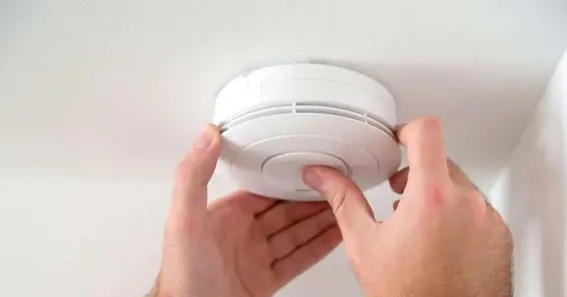A beeping smoke detector is a common household annoyance that often prompts the question: “Why is my smoke detector beeping?” Understanding the underlying causes is essential for maintaining safety and ensuring the device functions correctly.
Common Reasons for a Beeping Smoke Detector
- Low or Depleted Battery. One of the most frequent causes of a beeping smoke detector is a low or dead battery. Many detectors emit a chirping sound every 30 to 60 seconds to indicate it’s time for a battery replacement. This applies to both battery-operated and hard-wired units with battery backups.
- Accumulation of Dust and Debris Over time, dust, pet hair, and other debris can accumulate inside the smoke detector, interfering with its sensors and causing intermittent beeping or false alarms. Regular cleaning can prevent this issue.
- Environmental Factor: High humidity, steam, or extreme temperatures can trigger a smoke detector’s alarm or cause it to beep. Placing detectors too close to bathrooms, kitchens, or uninsulated areas can expose them to these conditions, leading to false alarms.
- Expired or Malfunctioning smoke detectors have a limited lifespan, typically around 10 years. An aging detector may beep to indicate it needs replacement. Regularly checking the manufacturing date and ensuring timely replacement is crucial for optimal performance.
- Power Interruptions or Electrical Issues. For hard-wired smoke detectors, power surges or interruptions can cause beeping. Ensuring a stable power supply and checking for loose connections can help resolve this issue.
Steps to Address a Beeping Smoke Detector
- Replace the Battery Start by replacing the battery with a fresh one, ensuring it’s properly installed and the compartment is securely closed.
- Clean the Detector Gently vacuum the exterior and interior of the detector to remove dust and debris. Avoid using water or cleaning solutions.
- Relocate the Detector If environmental factors are causing false alarms, consider moving the detector to a more suitable location, away from kitchens, bathrooms, or drafty areas.
- Reset the Unit After addressing potential issues, reset the detector by pressing and holding the test button for about 15 seconds.
- Replace the Detector If beeping persists after troubleshooting, it may be time to replace the unit, especially if it’s nearing or past its 10-year lifespan.
FAQ
-
Why does my smoke detector beep even after replacing the battery?
Persistent beeping after a battery replacement could be due to residual errors in the detector’s processor. Performing a manual reset can often clear these errors.
-
Can temperature changes cause my smoke detector to beep?
Yes, sudden temperature fluctuations or high humidity can affect the detector’s sensors, leading to false alarms or beeping. Ensuring proper placement can mitigate this issue.
-
How often should I replace my smoke detector?
It’s recommended to replace smoke detectors every 10 years. Regularly check the manufacturing date to ensure timely replacement.
-
Is it necessary to clean my smoke detector?
Regular cleaning is essential to prevent dust and debris from interfering with the detector’s sensors, which can cause beeping or false alarms.
-
What should I do if my hard-wired smoke detector is beeping?
For hard-wired units, check for loose connections or power interruptions. If issues persist, consult a professional electrician.








